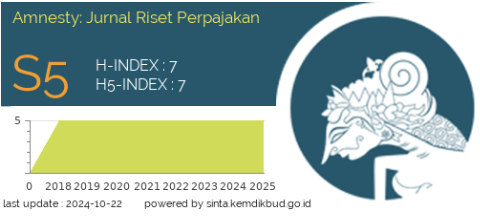PEOPLE
Author Guidelines
Authors who wish to submit manuscripts to Amnesty: Jurnal Riset Perpajakan must carefully follow the guidelines below. Manuscripts that do not comply will be returned prior to review.
1. Types of Articles
The journal accepts the following:
-
Original research articles
-
Conceptual papers
-
Case studies
-
Literature reviews
All must be relevant to the focus and scope of Amnesty: Jurnal Riset Perpajakan.
2. Language and Originality
-
Manuscripts must be written in English using clear, academic language.
-
Only original and unpublished works are accepted. Submissions must not be under consideration elsewhere.
-
Authors are fully responsible for ensuring their work is free from plagiarism.
3. Manuscript Format
-
Length: 8–20 pages.
-
Paper size: A4, margins 2.5 cm on all sides.
-
Font: Times New Roman, 11 pt, 1.15 spacing.
-
File format: Microsoft Word (.doc/.docx).
-
Authors must use the official template available on the journal website.
4. Structure of Manuscript
a. Title
-
Written in English, Times New Roman 16 pt bold.
-
Concise, informative, specific (8–16 words).
-
Must include main variables and, if relevant, context (location, sample, or field).
-
Avoid abbreviations, jargon, and phrases such as “A Study on…”.
b. Author(s) and Affiliation
-
Full names without abbreviation (Times New Roman 8 pt bold).
-
Affiliation: Faculty, University (Times New Roman 8 pt normal).
-
Email: must use institutional format (e.g., @abc.ac.id) (Times New Roman 8 pt italic).
c. Abstract and Keywords
-
Abstract: 150–250 words, one paragraph, Cambria 10 pt italic, single-spaced.
-
Content: background, objective, method, results, conclusion, implications.
-
Avoid citations, abbreviations, and repetition of title words.
-
Keywords: 3–5 words/phrases, separated by commas.
d. Main Sections
Introduction (600–900 words, 15–20%)
-
Global & local background, literature gap, problem statement, objectives.
-
Theoretical and practical contributions.
-
Font: Cambria 11 pt.
Literature Review / Theoretical Framework (900–1200 words, 20–25%)
-
Relevant theories, empirical evidence, hypothesis development (if quantitative).
-
Prioritize recent sources (last 5 years, Scopus/ISI preferred).
-
Examples: Agency Theory (Jensen & Meckling, 1976), Signal Theory (Suniari & Suaryana, 2017).
-
Font: Cambria 11 pt.
Research Methods (≈ 900 words, 15%)
-
Research design, population and sample, data collection, variables, and analysis.
-
Quantitative research: validity test, reliability (Cronbach’s Alpha), multicollinearity, normality.
-
Qualitative research: credibility, dependability, transferability, confirmability.
-
Mention ethical approval if involving humans/animals.
-
Font: Cambria 11 pt.
Results and Discussion (≈ 1800 words, 40%)
-
Results (Cambria 11 pt bold): descriptive statistics, findings with tables/figures, no interpretation.
-
Discussion (Cambria 11 pt bold): interpretation, comparison with prior studies, contributions, implications, limitations.
Closing (5–10%)
-
Conclusion: concise summary of findings, theoretical and practical implications.
-
Suggestions: recommendations for future research, policymakers, and practitioners.
References
-
Must follow APA 7th Edition.
-
At least 80% must be from peer-reviewed journals (Scopus/ISI preferred), last 10 years.
-
Authors must use reference management software (Mendeley, Zotero, EndNote).
-
Example:
-
Book: Bardach, E. (2024). Practical Guide for Policy Analysis: Eightfold Path toward Problem Solving. CQ Press.
-
Journal: Fatmawati. (2025). Relationship among stakeholders for solid waste management in Makassar. IOSR-JHSS, 21(5), 18–23.
-
5. Tables and Figures
-
Must be placed near the related text.
-
Tables: numbered sequentially, titles above.
-
Figures: numbered sequentially, titles below.
6. Submission Process
-
Submissions are made exclusively via the Online Submission System (OJS).
-
Authors must upload manuscripts using the journal’s official template.
7. Publication Fee
-
No submission fee.
-
Article Processing Charges (APC), if applicable, will be announced on the journal website.
8. Copyright and License
All published articles in Amnesty: Jurnal Riset Perpajakan are Open Access under the Creative Commons Attribution-ShareAlike 4.0 International License (CC BY-SA 4.0).
Manuscript Writing Checklist
☑ Title: concise, 8–16 words, reflects variables/context, no jargon.
☑ Abstract: 150–250 words, single paragraph, includes background, objective, method, results, conclusion.
☑ Keywords: 3–5 words/phrases.
☑ Introduction: 600–900 words, background, gap, problem, objectives, contributions.
☑ Literature Review: 900–1200 words, theories, prior studies, hypothesis (if any), recent Scopus/ISI references.
☑ Methodology: design, population, sample, instruments, analysis, ethics.
☑ Results: descriptive stats, findings with tables/figures, no interpretation.
☑ Discussion: interpretation, comparison, contributions, implications, limitations.
☑ Conclusion: summary, implications, recommendations.
☑ References: APA 7th, ≥80% journals (Scopus/ISI preferred, last 10 years).



